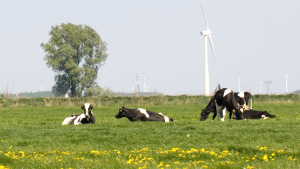Much of last week’s report from the IPCC– and the corresponding media headlines – talked about the truly apocalyptic consequences of not taking action on climate. The report spelled out just how bad things are already, but also used specially developed future scenarios (the Shared Socioeconomic Pathways, or SSPs) to show where we could be heading.
For example, future scenario 5 – 8.5 paints a picture of unmitigated disaster. But that’s only one of the five scenarios lined up in this report. At the other end of the line, SSP 1- 1.9 shows the world peaking at 1.5 degrees of warming before starting to cool. That’s worth repeating. It means there’s a plausible scenario where we don’t just stay within 2 degrees (the big hope from Paris) but we stay within 1.5 degrees of heating.
We’ve been seeing these last few years how the current 1 degree of warming is wreaking havoc with our world, so 1.5 degrees is not a happy future – but it is survivable. Of course, that’s a plausible pathway but we’re not on it yet. SSP1 1-9 describes a world characterised by inclusive development, reduced inequality and assertive global action on climate.
Inclusive development is key. Wherever the carbon’s produced – whether it’s using fossil fuels for much-needed electricity, having to use wood and dung to cook on or deforesting land to grow soya for our chickens – it ends up in the same atmosphere. Massive transfers of money and shifts in policy are needed so people can prosper without pollution. No-one’s safe until everyone’s safe. Or as Susan Aitken, leader of COP26 host city Glasgow says, social justice and climate justice are two sides of the same coin.
So getting and staying on that 1.5 pathway is a big ask for the G20 and the COP. But at least it’s more plausible than the worst case scenario in the report which is based on a doubling of coal power. That is definitely not going to happen. The report also reminds us that we need collectively to throw the kitchen sink at this. Everything matters – including or especially food and farming.
The report gives more prominence than previous reports to methane’s role in global warming. Because each molecule of methane only stays in the atmosphere about 9 years, reducing methane emissions quickly makes a difference. It’s not just cows and sheep – leaking gas pipes and rotting waste are just as important to tackle – but everything counts.

That’s why the Farming 1.5 report calls for early and concerted action to reduce methane. The target is reducing emissions in the livestock sector by 25% by 2030 and 50% by 2045, and it’s not controversial. The report was sponsored by us and the National Farmers Union Scotland, and produced by a panel of experts – we all saw this as the way forward for farming.
The report also underlines the contribution of nitrous oxide, which is much more long-lived and powerful greenhouse gas. Globally, at least two-thirds of this comes from agriculture through applying fertilisers; and half of the fertiliser we put on the ground doesn’t end up in the crop but gets wasted.
Organic farming doesn’t add new nitrogen into the system so helps to reduce nitrous oxide emissions. That’s why we and the organic stakeholders group are calling on Scottish Government to invest in the organic sector and to align with the ambitious new EU organic action plan.
The IPCC report is an assessment of where we are, and not a roadmap for where we need to go. So it doesn’t mention food waste – which when you count all the emissions from growing, processing, packaging, transporting, cooling, heating and disposing of food adds up to around 6% of global emissions.
If we’re going to throw the kitchen sink at climate change, food matters. And we need joined-up policies on what we eat, how we farm, what gets wasted and many other aspects of our complex food system. Inclusive development means a food system which delivers nutrition equity – healthy sustainable nourishment for all – as well as good livelihoods for food producers.
That’s why we’ve been working on the Glasgow Food and Climate Declaration – a global commitment by city, region and state governments round the world to use joined-up food policies to tackle climate change. And we’re delighted that Scottish Government is the lead signatory.
We don’t know why food is not on the UK Government’s agenda for COP26 – it seems to be in the ‘too hard’ box. But it is on Scotland’s agenda – and we can’t get on the 1.5 pathway without it.